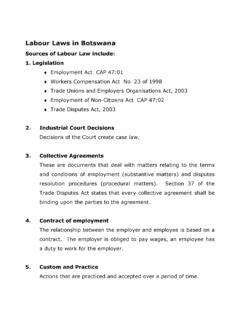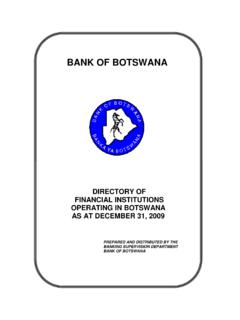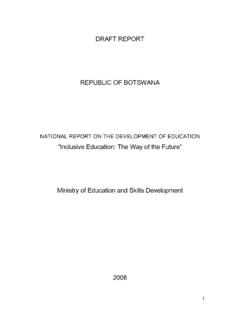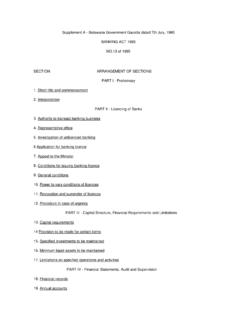Transcription of BOTSWANA - Africa4WomensRights
1 BOTSWANA . Women's rights protection instruments ratified by BOTSWANA : - CEDAW: ratified 1996. - CEDAW Protocol: ratified 2007. - Maputo Protocol: not signed Ratify! While BOTSWANA has ratified the Convention on the Elimination of all forms of Discrimination Against Women (CEDAW) and its Optional Protocol, BOTSWANA has so far failed to ratify or even sign the Protocol to the African Charter on Human and Peoples' Rights on the Rights of Women in Africa (Maputo Protocol). Respect! The Coalition of the Campaign is particularly concerned about the fol- lowing continued violations of women's human rights in BOTSWANA : application of discriminatory customary laws; access to property; violence against women; access to decision-making positions; access to employment and health services; and the persistence of discriminatory stereotypes and patriarchal attitudes.
2 / Some positive developments . The Coalition of the Campaign acknowledges several developments in recent years aimed at improving respect for women's rights, including: The adoption of the Domestic Violence Act in 2008, which criminalises many acts of gender-based violence and provides some protection to the victims. The adoption of the Abolition of Marital Power Act in 2007 which abolished the common law principle of marital power, according to which the husband was the sole administrator of the family estate, and replaced it with the principle of equality of the spouses with respect to the joint matrimonial assets. However, customary and religious marriages are unaffected by these reforms. The Act also abolished the common law principle of unity of matrimonial residence and allows women to choose their place of residence.
3 The adoption of the Children's Act 2009 (not yet in force) under which birth certificates contain the names of both parents. / But discrimination and violence persist IN LAW. BOTSWANA has a dual legal system, under which customary law is applied alongside common law. While there have been several reforms of discriminatory provisions under the common law, customary law remains particularly prejudicial to women's rights, perpetuating unequal power relations between men and women and strength- ening stereotypes on the role of women in society. Although the Constitution of BOTSWANA contains a provision on non-discrimination, under clause 15(4)(c) the prohibition does not apply to: adoption, marriage, divorce, burial, devolution of property on death or other matters of personal law.
4 Customary law remains deeply discriminatory against women, in particular in the areas of family and property law. For example: Marriage: While the Marriage Act was amended in 2001 to specify 18 years as the minimum age for marriage for both sexes with parental consent, many marriages take place under customary law according to which there is no such limit. The principle of marital power continues to apply to marriages under customary and religious law. Women are considered legal minors and require their husband's consent to buy or sell property and land, apply for a bank loans, and enter into legally binding contracts. Customary law authorises polygamy with the consent of the first wife, but it is not a common practice. Separation: In case of separation, custody is traditionally granted to the husband's family.
5 Mothers have only the right to visit. Although the Affiliation Proceedings Act of 1999 mitigated discrimination against children born out of wedlock, allowing women or care-givers to seek maintenance from the father; under customary law an unmarried mother has no right to receive such maintenance. The mother's own father has a duty to support the child. Inheritance: A widow has no right to inheritance from her husband; all property passes to the eldest son. If the husband had no sons, his eldest daughter can inherit but in such case property is administered by her male guardian. IN PRACTICE. Violence Violence against women remains highly prevalent. Although the Domestic Violence Act 2008 criminalised many forms of violence against women, under customary law and common rural practices men are perceived to have the right to chastise their wives.
6 The majority of crimes are unreported and those complaints that are regis- tered are rarely effectively investigated and prosecuted. In 2009, it was estimated by the United Nations that 3 in 5 women in BOTSWANA have experienced some form of domestic violence. BOTSWANA has also recently seen an increase in cases of murder of women by their partners. By law, the minimum sentence for rape is ten years, however, the majority of perpe- trators are not prosecuted or convicted. Marital rape is not criminalised. As a result post exposure prophylaxis (PEP) is not provided to married women who have been raped by their spouses. The Domestic Violence Act contains other significant gaps. For example, it empowers police officers to remove survivors of domestic violence from their residences but does not provide for the creation of shelters for victims of violence.
7 BOTSWANA currently has one such shelter, run by a NGO. Under-representation in political life While the Southern African Development Community (SADC) Declaration on Gender and Development includes a commitment to achieving at least 30% representation of women in political and decision making structures by 2005, BOTSWANA has failed to take effective measures to increase representation, for example by introducing a quota system. In 2008, there were only 7 women in the 61 seat National Assembly, 4 women in the 24 member cabinet and 4 women in the 35 seat House of Chiefs (an advisory upper chamber to the National Assembly). There were 3 female judges in the 13 seats High Court. In the October 2009 elections, of a total of 117 candidates, only 10 were women and only two were elected to parliament.
8 Obstacles to access to education and employment Whilst some efforts have been made by the government to increase girls' access to education, girls continue to drop out of education due to pregnancy, early marriage or to earn money to support their families. Although the law prohibits sexual harass- ment, it remains a serious problem both in schools and in the workplace. The Coalition of the Campaign calls on the authorities of BOTSWANA to: Reform or repeal all discriminatory Increase women's access to education statutory laws, in conformity with CEDAW, and employment, including by address- including by abolishing article 15(4)(c) of the ing socio-economic and cultural factors that Constitution and widely disseminating statu- impede access to education; and enforcing tory laws protecting women's rights.
9 Legislation on sexual harassment. Harmonise civil, religious and customary E. nsure women's access to health serv- law, in conformity with CEDAW and ensure ices, including by intensifying efforts to combat that where conflicts arise between statutory HIV/aids; providing PEP to women victims of legal provisions and customary or religious rape, including marital rape; and reforming law, the statutory provisions prevail. the Penal Code to decriminalise abortion in all circumstances. Eliminate discrimination against women concerning access to property, including E. nsure women's access to justice, including by raising awareness on land and property by adopting specific law to implement CEDAW. rights, especially of rural women, and expand- into national legislation and enable its provi- ing legal assistance to women wishing to file sions to be invoked before the national courts.
10 Claims of discrimination. implementing training for all law enforcement personnel; ensuring that women are aware Strengthen laws and policies to protect of their rights; providing access to free legal women from violence and support vic- representation. tims, including by criminalising marital rape;. establishing a legal aid system for women vic- Eliminate discriminatory cultural prac- tims of violence; ensuring effective prosecution tices and stereotypes, including through and punishment of offenders; implementing awareness-raising programmes targeting awareness-raising programmes for the gen- women and men, traditional and community eral population; and establishing shelters for leaders and the media. women victims of violence. R. atify the Maputo Protocol and the SADC.









